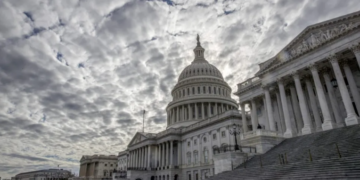President Joe Biden addresses the audience during a CNN-hosted presidential debate. (AP Photo)
June 29, 2024 Story by: Editor
On Friday, the Biden administration announced a new temporary protected status (TPS) for Haitians who arrived in the United States on or before June 3, 2024. This move will shield even those who entered the country illegally from being deported back to Haiti.
“We are providing this humanitarian relief to Haitians already present in the United States given the conditions that existed in their home country as of June 3, 2024,” stated Homeland Security Secretary Alejandro Mayorkas. “In doing so, we are realizing the core objective of the TPS law and our obligation to fulfill it.”
Immigration advocates have been urging the Biden administration to extend TPS to recently arrived Haitians since earlier this year, following the escalation of violence and the resignation of Haiti’s president.
This spring, despite the ongoing violence, the administration continued deporting migrants intercepted at sea and had not indicated any plans to extend TPS to additional Haitians.
The U.S. had previously designated TPS for Haitians who arrived before the 2010 earthquake and renewed this status as recently as 2022. Friday’s announcement will extend protection to an additional 309,000 Haitians in the U.S., according to the Department of Homeland Security (DHS). Advocates estimate this will bring the total number of Haitians with protected status to approximately 500,000.
Guerline Jozef, executive director of Haitian Bridge Alliance, expressed her joy over the announcement but emphasized the need for a permanent solution from Congress.
“I call on the U.S. Congress to pass comprehensive immigration reform that would create permanent protection for all [temporary protected status] recipients,” Jozef said.
She also highlighted that Haitians eligible for these protections contribute nearly $31 billion to the U.S. economy.
In Haiti, more than 1,100 people have been killed, injured, or kidnapped, with gangs controlling 80% of Port-au-Prince, the capital city, according to advocates. Source: Yahoo! News

















